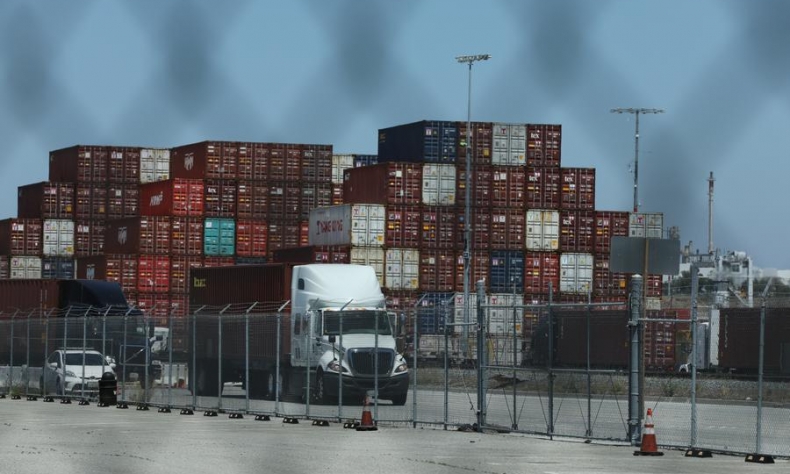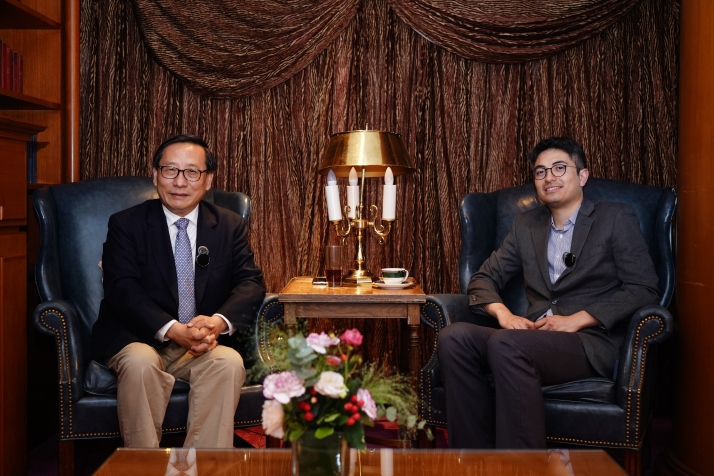Truce Over Tariffs

So the story is very simple—work with China on equal terms. Don’t deny China’s access. Because if you try to choke China, you end up with a much more formidable competitor.
During a recent seminar hosted by Beijing Review, key opinion leaders and influencers from China and the U.S., Gao Zhikai (Victor Gao), Vice President of the Beijing-based think tank Center for China and Globalization and former interpreter for Chinese leader Deng Xiaoping, and Danny Haiphong, an independent journalist and researcher on geopolitics in the U.S., discussed the current progress between China and the U.S. on tariffs, and the shifts in today’s world, as well as China’s role in the international community. Edited excerpts of their conversation follow:
Danny Haiphong: The U.S. and China have been locked in a cycle of tariffs for quite some time. Recently, however, during talks in Switzerland, the two nations reached what Western media has referred to as a “truce”—or at least a pause—in the imposition of the steep U.S. tariffs on China, which had threatened to exceed 145 percent.
Yet, despite this de-escalation on tariffs, the U.S. Commerce Department on May 12 issued new restrictions targeting Huawei’s advanced Ascend chips. According to a Reuters report, the guidance states that the use of these chips will be restricted “anywhere in the world,” and any company utilizing them could be in violation of U.S. export controls.
Could you discuss this latest development, which seems like an economic escalation, perhaps part of the broader U.S. strategy to contain China? Even as the U.S. appears to have stepped back from aggressive tariffs, this move suggests a continued economic offensive, including what the former U.S. President Joe Biden’s administration termed the “chip war.” What are your thoughts on this, and how do you see it fitting into the larger “trade war” dynamic?
Gao Zhikai: If we look at the world of today, the greatest predictability is the unpredictability of the Donald Trump administration. The greatest certainty is the uncertainty of the Trump administration. Now, whether this is a good thing or a bad thing depends on your perspective. For me, it’s a disaster. Because I think the U.S., the strongest military power in the world, the largest economy—if we use official exchange rate as the benchmark—a country with so many military bases in more than 100 countries in the world, is becoming such a source of unreliability, unpredictability and uncertainty. This will really shake up the world because lots of the businesses do not know where and how they want to make their medium-term and long-term investment.
And the second point is that this global “reciprocal tariff” war is the wrong one for the U.S. to fight. It’s not constructive. It’s not going to help the declared goal of moving manufacturing jobs back to the U.S.
So if we really sift through all these confusing things, I think, probably, Trump and his team started with some misleading presumptions. One is that by imposing maximum tariffs on China, China will crumble. Another indulgence of Washington may be, “I can use tariffs to block or to embargo some if not all the Chinese exports to the U.S. while U.S. exports to China will have a free walk in the China market.” That’s fantasy. If you want to block all the Chinese exports to the U.S., there will be no more export of U.S. products to the China market—the largest market in the world today that will become more and more important in the coming years and coming decades.

Washington has been coercing Walmart into eating up all the tariffs, rather than passing them on to the consumers. That’s not market practice. If a government introduces tariffs, traders like Walmart need to pass on the costs to the end users. Eventually all the American people need to pay the tariffs. And it will cause inflation. I think it will make life for people in the middle-class or lower income bracket even more difficult.
From the Chinese perspective, this trade war will cause a lot of difficulty and hardships for Chinese exporters. But we will stabilize the situation as we analyze more than just economic losses and gains. China really views this in a very philosophical way. This time, the U.S. is trying to destroy free trade. China wants to protect free trade, so we need to stand firm in protecting it. China does this not just for its own benefit, but for all countries’ benefit as well as for the fundamental interest of the American people.
Washington should really come back to its senses. A tariff war does not solve the problem, nor does a technological war. And competition on fair terms should be encouraged, because that means mankind is still moving forward while making progress. No one has a monopoly on technological innovation. No one can monopolize the creativity of humankind.
So the story is very simple—work with China on equal terms. Don’t deny China’s access. Because if you try to choke China, you end up with a much more formidable competitor.
Haiphong: There’s growing attention to this reality—or acknowledgment of it—even within mainstream Western media circles. The New York Times discusses how China could make the U.S. irrelevant and be the new dominant power. The Economist highlights how China has now become “cool.” Western influencers and major figures are streaming here, showcasing China to their audiences. Meanwhile, the South China Morning Post notes the shifting power dynamics, emphasizing that the U.S. must now engage with China on a fully equal footing.
This shift is striking because, not long ago, and even today, to some extent, U.S. foreign policy circles and mainstream media often portrayed China in a dismissive or even derogatory light. Yet increasingly, there’s recognition of a new reality: The relationship between the two has changed dramatically. What has driven this shift? How do you see it unfolding in the broader context?
Gao: First of all, I would say the international order we live in now was established in 1945 after defeating Nazi Germany in Europe and Japanese fascism in the Asia-Pacific. It’s structured around the United Nations (UN). And the international order established in 1945 was never meant to be a unipolar world. It was always supposed to be a multipolar world. And that’s the reason why there are five permanent member states of the UN Security Council, each with a veto power.
Now, since 1945, there have been ups and downs in international relations. But China has always been very much at the head of the table. China was the first country to sign the UN Charter. No one in the world should try to dismiss how much China has been contributing to civilization of mankind as a whole.
Secondly, I think it’s time for the U.S. to practice what professor Paul Kennedy of Yale University said, “Don’t overreach.” This probably is exactly what’s happening when the U.S. Government publicly announces their policy prohibiting all the countries in the world from using Huawei chips. It’s a typical example of overreach, which will exhaust the U.S. and hollow out its overall strength.

China does not want to see the decline of the U.S. and China’s peaceful rise is not premised on the decline or the demise of the U.S. I believe the two countries can coexist very well. Chinese President Xi Jinping has said and continues to assert the world is big enough to accommodate both countries, and one country’s success is an opportunity for the other.
I believe the world will be better served if China and the U.S. view and deal with each other as equals. I even coined a term: MerryChina, where China and America combined together will become a MerryChina. And I hope that will make the world a merrier world.
Haiphong: The West, with the U.S. at its head, continues to talk about China and its own “sphere of influence,” which mainly centers in the Asia-Pacific, but includes the entire Global South and global majority. Whenever China is talked about in the Western media, it’s usually with China seeking a sphere of influence. What’s your assessment of this?
Gao: China is a country really focusing on the world as a total sphere of influence. By promoting free trade, it now is the largest trading partner of about 140 countries and regions in the world. And for the remaining 60 some countries, China probably is the second largest trading partner.
All countries in the world are equally important. China views each country, big or small, as a country that China needs to engage with on equal terms.
China has helped Indonesia to build the high speed railway from Bandung to Jakarta. It is helping Malaysia to build the East Coast Rail Link. China has helped Peru build the very sophisticated Chancay Port. It is working with Brazil to build highways and railways, connecting the Atlantic coast to the Pacific coast, linking it with Shanghai Port.
There are numerous such examples. Why? Because when China initiated its reform and opening-up policy in 1978, it adopted two principles. The first principle is that building a road will make more money for all involved stakeholders. We want to build roads so that efficiency and connectivity will be promoted. Secondly, a country cannot really achieve real wealth without developing its industry. So China always wants to build factories to produce something rather than spending the bulk of the time on financial engineering. Financial development is important, but it can never replace industrial production. So we want to build connectivity. We want to maximize productivity and efficiency. We want to make sure that China produces and invents.
China is promoting free trade and it is working very hard to produce for the benefit of all the consumers in the world. That means the world is a totality for China, which should not be divided up into spheres of influence. Using a pragmatic perspective to look at China, people will come to the conclusion that the country is a force for good.
 Facebook
Facebook
 Twitter
Twitter
 Linkedin
Linkedin
 Google +
Google +










